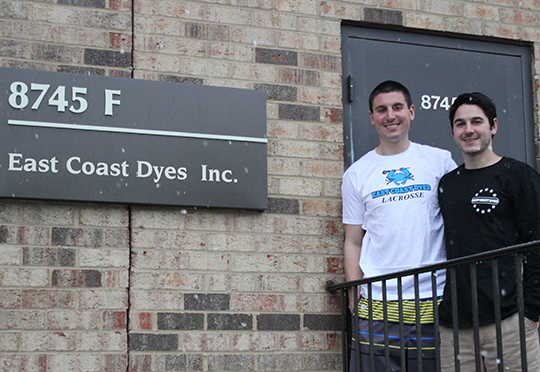 How many lacrosse sticks does it take to start a business?
How many lacrosse sticks does it take to start a business?
For Elizabethtown College alumni Greg and Mike Kenneally, it doesn’t take many.
The twin brothers, accounting majors from the Class of 2011, found their start through Greg’s role as “stick doctor” for the College’s lacrosse team. Greg’s job was to restring and dye sticks for his teammates—lacrosse sticks take quite a beating during matches and scrimmages.
To make a little money while still in school, Greg offered the same services online through eBay. This gave him a source of income, as well as a starting point for the business he and Mike would eventually run, said a story on CNBC in which the Kenneallys were recently featured.
The E-town team’s move from a turf field to a grass one inspired the twins to look into the develop of their own lacrosse stick mesh because even the weatherproof mesh Greg purchased “couldn’t stand up to rain and mud,” he said in an ‘Elizabethtown’ magazine article.
I would like to think that our curriculum … facilitates students to be able to successfully consider and pursue interesting opportunities when they arise.”
 It was during the brothers’ graduate school days at Towson University in Baltimore, Md., that they made a breakthrough. For a few weeks, Greg played with wax as a weatherproofing material on his lacrosse stick string. Then, he began to sell the wax-coated, weatherproof mesh.
It was during the brothers’ graduate school days at Towson University in Baltimore, Md., that they made a breakthrough. For a few weeks, Greg played with wax as a weatherproofing material on his lacrosse stick string. Then, he began to sell the wax-coated, weatherproof mesh.
The ‘Elizabethtown’ magazine article reveals that, for Greg, selling this mesh online was a hobby, something he did on the side during his breaks between classes and homework. However, demand skyrocketed, and, by May of 2012, he and Mike formed a partnership. Today, the company has approximately 20 employees and operates out of a 9,000-square-foot facility.
Terrie Riportella, director and chair of the accounting program at Elizabethtown College, has been a self-proclaimed “cheerleader from the sidelines” for the Kenneallys.
She said that, thanks to E-town’s accounting courses, the twins were knowledgeable about entrepreneurial ventures. “I would like to think that our curriculum, which encourages a broad business background by requiring accounting majors to take the same foundation courses as other business majors, facilitates students to be able to successfully consider and pursue interesting opportunities when they arise,” Riportella said.
It helps, she said, that all of the accounting faculty and much of the department have business experience outside of academia. Those “backgrounds and experiences we can bring into the classroom help students see the different opportunities that may be available to them down the road,” she said.
As the Kenneally twins continue to operate their successful business out of Maryland, it’s safe to say that, for them, their sport and E-town business, accounting and entrepreneurial courses really ‘mesh.’

